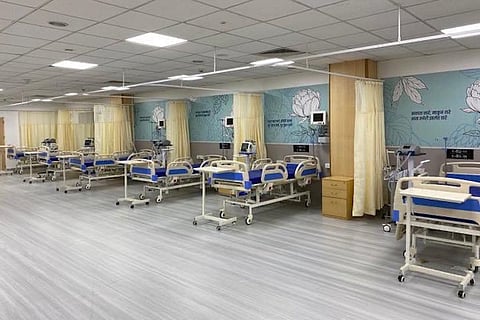

With a sudden surge of COVID-19 cases, Bengaluru is staring at a potential crisis regarding COVID-19 beds like that witnessed during mid-2020 when lack of hospital beds/ oxygen and intensive care units (ICUs) led to loss of lives. It may be recalled that then the Bruhat Bengaluru Mahanagara Palike (BBMP) had launched a real-time bed availability dashboard in mid-July as instructed by the Karnataka High Court. But with the drop in case numbers, the real-time dashboard was disbanded in November (2020) and the order to block beds and ICU facilities for COVID-19 patients were also withdrawn.
Cases of COVID-19 in Bengaluru have been on a gradual decline on a monthly basis since September, 2020 with the total number of cases. But in March, there has been a reversal of trend with 8,563 cases reported by March 18 while 6,813 cases were reported for the month of February.
| MONTH | COVID-19 CASES |
| NOVEMBER | 32101 |
| DECEMBER | 18551 |
| JANUARY | 10311 |
| FEBRUARY | 6813 |
| MARCH (till 18) | 8563 |
But now again incidents of patient parties struggling to find beds are coming to light with the unavailability of reliable real-time information.
Meanwhile, phone calls from people unable to find Covid beds in Bangalore & asking for help have started. Hope we don’t have to relive the recent past.#MaskUp people & please ignore the WhatsApp rumours & go get the #vaccine
— Somalaram Venkatesh (@serioustaurean) March 18, 2021
The trend of occupancy of beds in both government and private hospitals in Bengaluru seem to be similar but the situation is not alarming at present.
Dr Venkateshaiah, Medical Superintendent of the KC General Hospital, said that at present the hospital has 130 COVID-19 beds including ICU and oxygen beds and around 62 patients are under treatment. “For the past one week, we have been getting a sudden rise of patients. 15-20 days back, we had patients in single digits in our hospital. But since then we have seen a steady increase in daily admissions,” he added.
Dr Manjunath Thimmappa, Consultant - Critical Care Medicine, Manipal Hospitals said, “In December, daily admissions were drastically reduced to 1-2 admissions per day for COVID-19 and the ICU saw 3-4 cases per week. However in the past two weeks, the numbers have doubled to 3-4 cases per day for COVID-19 wards and the ICU ward saw a rise in cases of 1-2 admissions per day.”
The only silver lining in this second wave is that a majority of the cases which are reported are not critical. Incidentally the number of fatalities have been on the decline as well with the exception being February.
| MONTH | DEATHS |
| OCTOBER | 897 |
| NOVEMBER | 271 |
| DECEMBER | 184 |
| JANUARY | 66 |
| FEBRUARY | 88 |
| MARCH (till 18) |
54 |
Dr Chaitanya Pathania, General Manager, Columbia Asia Hospital, said, “The cases have definitely increased from December, however the morbidity/criticality of the cases at present is low. Due to this reason, there is a slight surge in requirement for ward beds, however, demand for ICU beds is low as of now.”
| DATE | ICU PATIENTS |
| March 18 | 51 |
| March 11 | 49 |
| March 4 | 49 |
| February 25 | 121 |
| February 18 | 125 |
| February 11 | 137 |
| February 4 |
146 |
Dr Manjunath said increased awareness about the disease has led to early admissions which has led to a low number of critical cases and a faster recovery period as well.
The doctors said the recent surge makes routine patients hesitant to visit hospitals for their ailments including those of chronic diseases who are missing their routine check-ups.
Dr SN Aravinda, Consultant, Internal Medicine, Aster RV Hospital said there is a tendency for people to ignore the safety norms as it has been almost a year since the pandemic. “For the upcoming Holi festival, large gatherings to celebrate should be avoided. People must continue to wear masks, maintain physical distancing, hygiene and take the vaccine. Only when there is herd immunity and a dramatic drop in cases can we consider uplifting of COVID-19 safety norms,” he said.
Similarly, Karnataka COVID-19 War Room-in charge and senior IAS officer Munish Moudgil said the primary control is in hands of individual citizens who must and must wear masks, avoid undue contact with crowds and other practices like physical distancing and hand hygiene. He said, “Present COVID-19 case pattern seen is that the whole of family is testing positive. The reason is inside the house people are failing to isolate anyone with COVID-19 or COVID-like symptoms - a basic requirement which is not being followed.”
Taking note of the situation, Karnataka Health and Medical Education Minister Dr K Sudhakar on Thursday chaired a meeting with senior officials and heads of key government hospitals on Thursday. “In the next 50 days doctors, healthcare workers and officials are set to work in mission mode. War Room will start operating as it was during last year and the government will monitor the situation using real-time data. Decision has been made to recruit resident doctors and paramedical staff on a temporary basis,” he said following the meeting. He added the government will hold the first round of discussion with private hospitals this week to reserve beds for treatment of COVID-19 patients.